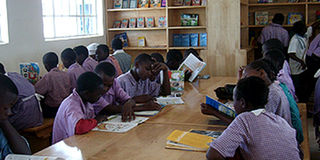Schools accused of tender abuse

Students reading in a library. The Kenya Booksellers and Stationers Association (KBSA) accused some schools of unnecessarily splitting tenders to profiteer from non-refundable tender fees. Photo/FILE
What you need to know:
- Lobby complains that some institutions split contracts to gain from additional levies
- Booksellers on the warpath over ‘unnecessary’ non-refundable fees
A row is brewing between a booksellers lobby and schools over a non-refundable standard fee charged for tenders.
The Kenya Booksellers and Stationers Association (KBSA) accused some schools of unnecessarily splitting tenders to profiteer from non-refundable tender fees.
The tender business, the association claimed, had become a cash cow due to the corruption that threatens provision of services to the learning institutions.
KBSA national chairman Arthur Kamau told the Nation that a supplier had to part with as high as Sh12,000 to apply for four tenders covering the same type of items from one institution that could have been advertised as one but split to attract more application fees.
“Each tender attracts a non-refundable tender fee of Sh3,000, which is never accounted for, yet these are goods supplied by one person but have just been deliberately split to make extra money for some people,” Mr Kamau said.
He displayed a recent advertisement in the local dailies from a national school that had placed supply of textbooks and learning materials separately from supply of printed and general stationery, which are related items that can be supplied by one person.
The association also accused some schools of ignoring procurement guidelines that provide that tenders should be strictly for orders that cost more than Sh500,000 while the rest of the orders should be serviced through quotations.
The booksellers faulted the Public Procurement Oversight Authority (Ppoa) for doing little to minimise breaches of procurement guidelines by schools at the expense of booksellers.
The association members claimed that the more than 3,000 secondary schools in the country were collecting in excess of Sh900 million annually from those applying to supply various items to their schools.
“This is money that can fund the free primary education programme by increasing the amount allocated per child given that the introduction of the VAT on books has reduced the school’s purchasing power,” Mr Kamau said.
The association further warned that it had cancelled supply of books to schools on credit under the free primary and subsidised secondary education programmes due to delay by the institutions to honour their promises.
More than 95 per cent of the association’s business depends on universities, secondary and primary schools and the delayed payments affects trade, Mr Kamau said.




